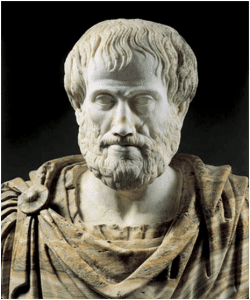There is perhaps no greater philosopher, scientist, ethicist or theologian born so far, apart from Aristotle (Αριστοτέλης). This year marks 2400 years since his birth, and numerous international scientific conferences and symposia are being organised for the occasion, to honour who many regard as the greatest intellect in Western history that ever walked on our planet.
Aristotle was born in 384 BC, in Stageira (Στάγειρα) of Chalkidiki (Χαλκιδική), a peninsula in northern Macedonia, and died in Chalkida (Χαλκίδα), a town in Euboia (Εύβοια), opposite Attica, in 322 BC.

His father was a doctor of the Macedonian King, whilst his mother was of aristocratic descent. At the age of 17 he was orphaned, due to the early death of both parents, and the husband of his eldest sister sent him to Athens to study at Plato’s Academy, where he stayed for 20 years. There he developed a strong relationship with Plato, and met and knew all the contemporary philosophers of his time.
In 342 BC he was called by Philip II, the king of Macedonia, to become tutor to his 13 year old son Alexander. Aristotle stayed with him six years, having taught him the Greek spirit, and its universal importance. He then returned to Athens where he established his own School of philosophy, with the name “Lyceum”. It is in Athens that he wrote the greatest volume of his works, continuing research with maps and scientific instruments, while supervising a large number of students, whose scientific works, written in papyruses, filled a whole library. He survived a further 13 years, and was buried in Stageira with great honours, whilst his School continued its work for many years, as a beacon of knowledge and research.
He was the author of a philosophical and scientific system that became the framework and vehicle for both Christian Scholasticism and medieval Islamic philosophy.
It was Aristotle’s conviction that everyone should do philosophy, because even arguing against its practice is a form of philosophising. The best form of philosophy is the contemplation of the nature of the universe: it is for this purpose that God made human beings and gave them a God-like intellect. All else – strength, beauty, power, and honour – is worthless.
He held the view that the Soul is imprisoned in the body, and is capable of a happier life only when the body has been left behind. Accordingly, the dead are more blessed and happier than the living, and to die is to return to one’s own home!
Since it is not possible to deal with all the works of Aristotle in the narrow space available to us, we shall restrict ourselves to the most significant one, dealing with matters spiritual, called “Metaphysics”. In this, he asserts there are three types of “Theoretical Sciences” – the Mathematical, that of Physics and Theological! It is this third that is of most interest to us as Christians. It concerns itself with the reality that surpasses the physical world, and deals with the supernatural truth, which is above any simple metaphysical concept.
“If God is in a state of perpetual happiness, like the which we only momentarily experience, then he is an admirable being, and whilst his happiness is superior, so his existence is wondrous. In truth that is how it is. God is the basic origin of life, and because life is an energy of the mind (nous), he (God) is energy himself; the most pure energy however, the most excellent and everlasting life. For this reason we say that God is the living, everlasting, and most excellent Being. It follows then that eternity and continuation in time belong to God, exactly because he is God”. (Metaphysics XII,7).
Source: February – March 2016 Lychnos Edition
